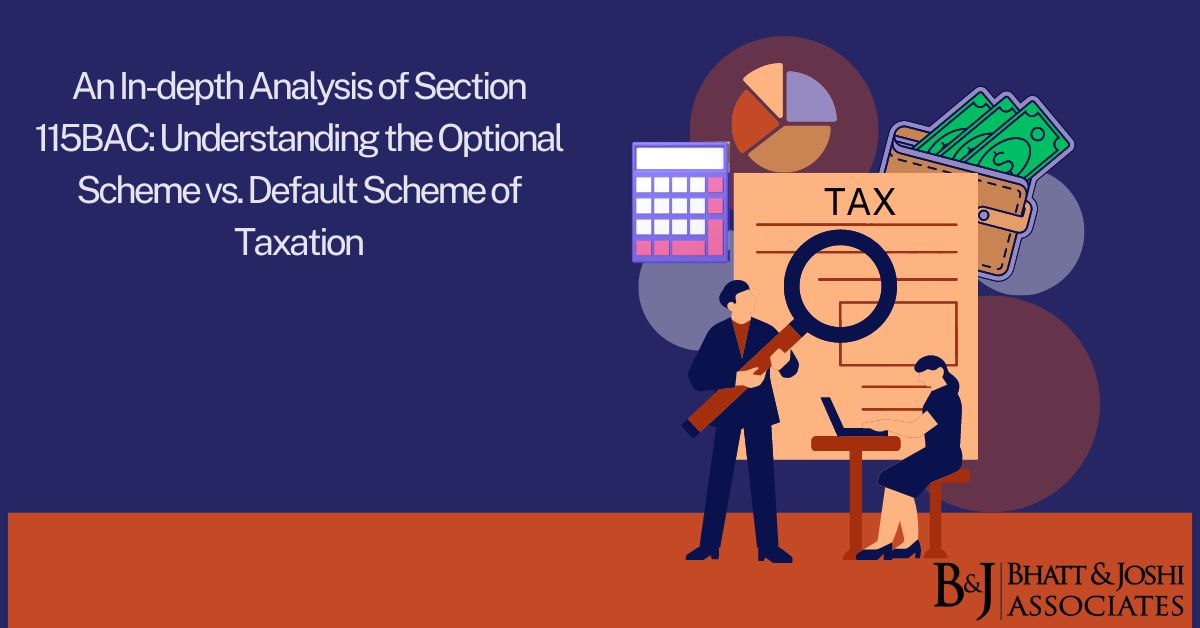Introduction:
The landscape of taxation in India has witnessed significant changes over the years, with amendments and new provisions being introduced to streamline the system and enhance compliance. One such notable change is the introduction of section 115BAC under the Income Tax Act, offering taxpayers an alternative tax scheme. Effective from the assessment year 2024-2025, this provision presents taxpayers with a choice between the default tax regime and an optional scheme, each with its own set of implications and considerations.
In this comprehensive analysis, we delve deep into the intricacies of section 115BAC, exploring its provisions, implications, eligibility criteria, filing procedures, and comparisons with the existing tax structure. Through detailed discussions and insights, we aim to equip taxpayers with the knowledge and understanding needed to navigate through these changes and make informed decisions regarding their tax planning strategies.
Understanding Section 115BAC:
Section 115BAC of the Income Tax Act, introduced by the Finance Act of 2023, provides taxpayers with an optional tax regime, offering an alternative to the existing tax structure. Under this provision, taxpayers have the flexibility to choose between the default tax regime and the optional scheme, based on their individual circumstances and preferences.
- Tax Slabs and Rates:
- The tax slabs and rates under section 115BAC for the assessment year 2024-2025 are as follows:
- Nil tax for income up to Rs. 300,000
- 5% for income between Rs. 300,001 to Rs. 600,000
- 10% for income between Rs. 600,001 to Rs. 900,000
- 15% for income between Rs. 900,001 to Rs. 1,200,000
- 20% for income between Rs. 1,200,001 to Rs. 1,500,000
- 30% for income above Rs. 1,500,000
- The tax slabs and rates under section 115BAC for the assessment year 2024-2025 are as follows:
- Comparison with Previous Tax Slabs:
- The tax slabs under section 115BAC for the assessment year 2024-2025 differ from the previous tax slabs, which had wider income brackets and higher tax rates.
- A comparison between the two structures highlights the changes and their implications for taxpayers.
- Eligibility Criteria:
- Taxpayers eligible to exercise the option under section 115BAC include individuals, Hindu Undivided Families (HUFs), Bodies of Individuals (BOIs), Associations of Persons (AOPs), and Artificial Juridical Persons.
- Previously, the option was limited to individuals and HUFs only, whereas now, it extends to a wider range of entities.
- Opting for the Scheme:
- Taxpayers opting for the optional scheme need to follow specific procedures based on their income sources:
- Individuals and HUFs with business income must file Form 10IE along with the income tax return (ITR) before the due date specified under section 139(1).
- Individuals and entities without business income can exercise the option while filing the ITR, without the need for a separate form.
- Taxpayers opting for the optional scheme need to follow specific procedures based on their income sources:
- Switching In and Out:
- Taxpayers without business income have the flexibility to switch between the default and optional schemes annually.
- However, those with business income can opt out of section 115BAC only once, and the decision applies to subsequent assessment years.
- Exemptions and Deductions:
- Several exemptions and deductions are not allowed under section 115BAC, including those related to house rent allowance, allowances to MPs/MLAs, SEZ exemptions, standard deductions, and certain deductions under Chapter VI-A.
- Taxpayers need to consider these restrictions when opting for the optional scheme and assess the impact on their tax liability.
Implications and Considerations:
The introduction of section 115BAC brings about significant implications and considerations for taxpayers, requiring careful analysis and planning. Some key points to consider include:
- Tax Planning Strategies:
- Taxpayers need to evaluate their income sources, deductions, and exemptions to determine whether opting for the optional scheme aligns with their tax planning objectives.
- Consideration should be given to the impact of the scheme on the overall tax liability and financial goals.
- Compliance Requirements:
- Taxpayers opting for the optional scheme must adhere to the prescribed procedures for filing Form 10IE and complying with the eligibility criteria.
- Failure to comply with the requirements may lead to penalties or adverse consequences during tax assessments.
- Long-term Implications:
- Taxpayers need to assess the long-term implications of opting for the optional scheme, considering factors such as future income projections, business dynamics, and changes in tax laws.
- A thorough analysis of the potential benefits and drawbacks of the scheme is essential for making informed decisions.
- Professional Guidance:
- Seeking advice from tax professionals or financial advisors can provide valuable insights and assistance in understanding the implications of section 115BAC.
- Professionals can help taxpayers assess their eligibility, analyze their tax situations, and develop appropriate strategies to optimize tax outcomes.
Conclusion: Navigating the Implications of Section 115BAC
Section 115BAC offers taxpayers an alternative tax regime, providing flexibility and potential benefits in managing their tax liabilities. However, the decision to opt for the optional scheme requires careful consideration and analysis of various factors, including eligibility criteria, compliance requirements, and long-term implications.
By understanding the provisions and implications of section 115BAC, taxpayers can make informed decisions aligned with their financial goals and obligations. With proper planning and professional guidance, taxpayers can navigate through these changes effectively and optimize their tax outcomes in the evolving tax landscape of India.














